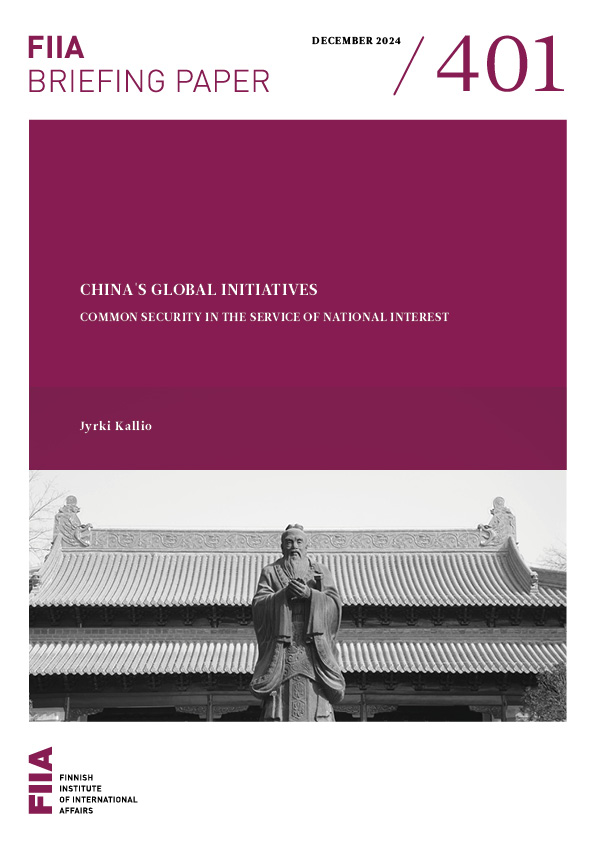The end of the Cold War meant that the Arctic region lost most of its geostrategic relevance. However, due to growing great power competition, the Arctic is back on the geopolitical map.
Hard security dynamics in the region are defined by two key elements: the importance of conventional long-range missiles and nuclear weapons for Russia, and the importance of the North Atlantic sea line of communication for European defence.
Russia has revitalized its Cold War-era bastion strategy, which aims to ensure the survival of its strategic ballistic missile submarines. In a crisis scenario, this strategy could pose serious challenges to the Nordic countries as well.
Five Arctic states are members of NATO and the Alliance’s collective defence is operational in the Arctic. Even if the Arctic is still not a focus area for NATO, the North Atlantic maritime domain is increasingly back on the agenda.
Given the divergent strategic interests and lack of common ground between Russia and other Arctic states on grand strategic issues, the Arctic will not be losing its geostrategic importance anytime soon.
Introduction: Increased military activity in the European Arctic
During the Cold War, the Arctic was a region of utmost geostrategic relevance. The shortest trajectory for nuclear weapons between the United States and the Soviet Union crossed the Arctic, making the region essential for the nuclear deterrence of the two superpowers. As a result, the region became the centre of strategic competition between the two countries.
The end of the Cold War meant that the region lost most of its geostrategic relevance. In the post-Cold War era, the focus in Arctic affairs shifted from military to environmental and socio-economic issues. The Arctic – formerly one of the most militarized regions in the world – came to be understood as an exceptional “zone of peace” and a “territory of dialogue”, characterized by well-functioning international co-operation.
However, we no longer live in the optimistic post-Cold War world of the 1990s, in which exceptional Arctic co-operation emerged and took its forms. Even though political actors in the region have tried to isolate it from tumultuous world politics, the broader geostrategic situation has changed during the past five years. The rise of power politics and intensifying strategic competition between great powers have had impacts on the security environment in Northern Europe and the Arctic as well.
Russia’s turn towards a more assertive and revisionist foreign policy in combination with its military build-up and improved military capability have brought forth new challenges for the defence of Northern Europe. Analyses of these challenges often concentrate on the Baltic Sea region. However, in order to form a comprehensive picture of Northern Europe’s security environment, one also needs to be aware of the hard security dynamics in the High North, namely the European side of the Arctic.
Russia’s focus in the Arctic has shifted towards hard security issues and Moscow has continued to develop its military capabilities in the region. This has included improvements in force composition, readiness levels, base and command structures, as well as in the tempo of exercises. NATO and Western actors have responded, for instance by re-establishing a maritime presence in the North Atlantic and increasing major military exercises in Northern Europe.
This Briefing Paper maps out the most important hard security dynamics in the Arctic. The paper focuses on concrete actions taken by key players in enhancing their military posture and adapting to the current security environment. Key elements of Russia’s bastion strategy and its potential consequences for the Nordic states, as well as NATO’s increasing presence in the North Atlantic, are investigated. The paper concludes by highlighting that the Arctic region’s geostrategic relevance is only likely to increase in the future.
Nuclear deterrence and the North Atlantic connection
Arctic scholars and experts broadly agree that the potential for a major interstate Arctic conflict due to intra-Arctic factors – such as border delineation disputes or resource competition – is quite low. Instead, the most likely source of a conflict would be extra-Arctic, stemming from political dynamics outside the region.
Today’s hard security dynamics in the region are defined by two key elements: the importance of conventional long-range missiles and nuclear weapons for Russia’s international aspirations, and the importance of the North Atlantic sea line of communication (SLOC) for European defence. Both of these elements are related to the broader international situation, and hence they are not Arctic-specific as such.
First, Russia has two overriding strategic goals that it pursues with all available means: maintaining regime stability domestically and achieving a great power status. Russia lacks economic power, soft power beyond certain former Soviet republics, and a broad network of allies in world politics that are typical of great powers. Consequently, Moscow sees its influence in global affairs as being based largely on its military power, as witnessed for instance in Ukraine and Syria. Ultimately, Russia sees its national security and international influence as being based on nuclear weapons. In terms of nuclear capabilities, Russia is a global and not just a regional superpower, and more or less on a par with the United States.
In this equation, the Arctic is of the utmost importance. The Russian strategic nuclear triad is present in the Arctic, and the submarine-based part of the triad is particularly notable. The ballistic missile submarines operating under the Arctic Ocean ice cap are very hard to detect, making them suitable for a second strike in the unlikely event of a nuclear war. Consequently, Russia has strategic military forces on the Kola Peninsula: a total of 81.5 per cent of Russian strategic maritime nuclear capabilities are concentrated in the Northern Fleet.1 The Arctic is also a site for conventional long-range air, sea and land missile capabilities, and thus important for the country’s conventional deterrence and global power projection.
Secondly, the Arctic Ocean is of key importance for Moscow’s power projection as it also provides Russia with its only uncontested access to the Atlantic Ocean. Although some important steps have been taken in Europe to improve territorial defence, European defence continues to be highly dependent on US military power. In the event of a major military conflict between Russia and NATO, the North Atlantic SLOC would play an essential role for the reinforcement of forces from North America to Europe.
In this scenario, it would be of great interest to Russia to be able to disrupt this SLOC in order to delay or prevent NATO’s reinforcements. To be able to operate in the North Atlantic, Russian maritime surface vessels and submarines would need to enter the ocean from the Arctic through the chokepoints of the Greenland-Iceland-United Kingdom (GIUK) Gap (see map below). Consequently, it would be of great interest to NATO to be able to control this region and its vicinity and to sustain an adequate maritime awareness and antisubmarine warfare (ASW) capability higher up north in the Norwegian Sea. Russian sub-surface operations in the North Atlantic would also pose a risk to NATO’s strategic deterrence forces, as well as to critical data cables connecting Europe and North America.
Russia and the bastion strategy
The bastion strategy is a Russian defence concept from the Cold War era. It aims to ensure the survival of strategic ballistic missile submarines – as well as the related infrastructure – in their enclosed and well-defended maritime areas, or “bastions”. In addition to relying on geographical cover (e.g. the ice sheet), this is achieved by establishing a layered defence system with various capabilities, such as sensors, mines, coastal and surface-to-air missiles (SAM), as well as maritime and air capabilities.
In recent years, Russia has revitalized the concept in the Arctic and demonstrated this in several large-scale exercises. This is in line with the Russian 2017 naval doctrine, which calls for strengthening the navy’s abilities to defend Russia’s maritime approaches and littoral waters, and improving the navy’s capabilities to strike targets at long range with conventional and nuclear weapons.2
During the last decade, Russia has invested heavily in military modernization. This also affects assets in the Arctic, including land forces, air-defence systems and strategic submarines (of the Borei class).
[caption id="attachment_92525" align="aligncenter" width="800"] Strategic points of the Arctic region include the GIUK Gap and Svalbard archipelago. Shaded areas depict Russia's Bastion Strategy: darker shaded area: ambition of control; lighter shaded area: ambition of denial. Map: Kauko Kyöstiö. Source: House of Commons Defence Committee 2018.[/caption]
Strategic points of the Arctic region include the GIUK Gap and Svalbard archipelago. Shaded areas depict Russia's Bastion Strategy: darker shaded area: ambition of control; lighter shaded area: ambition of denial. Map: Kauko Kyöstiö. Source: House of Commons Defence Committee 2018.[/caption]
As part of its Arctic bastion strategy, Russia has since 2007–2008 re-established long-range aviation patrols. Russia has also re-opened various Soviet-era air bases throughout the Russian Arctic and established new military bases on several key Arctic Ocean islands. In addition, Russia’s new strategic military command in the north has brought together the Northern Fleet and other units in the Arctic under a unified structure, and Moscow has conducted massive, unannounced snap exercises to test its operational readiness. These exercises have demonstrated Russia’s capability to transfer forces quickly from Western and Central military districts to the Arctic.
The country has further deployed intermediate and long-range air defence systems in its Arctic, including on many of its Arctic islands, which substantially increase Russia’s anti-access/area denial (A2/AD) capabilities in the region. The level of Russian naval activity has also grown significantly: Russian submarine activity up to the GIUK Gap has been reported as currently “equalling or surpassing Cold War levels”.3
The bastion defence is further supported by high-quality attack submarines of the Akula II and Severodvinsk class, smaller surface ships with medium- and long-range missiles, as well as two motorized infantry brigades near the Norwegian (Peshenga) and Finnish (Alakurtti) borders. These brigades are reported to be equipped with battle tanks, armoured vehicles, self-propelled artillery, air defence systems and air assault capability.4
The bastion strategy and the Nordic countries
Russia has legitimate security interests in the increasingly active Arctic, related for instance to border control, safety and security in the Northern Sea Route, and to maintaining credible forces to secure critical hydrocarbon assets in the region. However, the bastion strategy is extra-Arctic in the sense that its main rationale is linked to Russia’s broader geostrategic goals and great power competition. As such, the tenser the broader international situation gets, the more important the bastion strategy becomes as an element in Arctic hard security calculations.
Even though the bastion defence concept contains the word “defence”, the concept has both defensive and offensive elements. Similarly, Russian military capabilities in the Arctic can be used for defensive and offensive purposes. It has been argued that “even Moscow’s defensive posture would seek to either deny or limit access to the NATO region north of the GIUK Gap in wartime”5 and that in the High North, “Russia’s perception of vulnerability […] could trigger offensive actions at the expense of the Nordic countries […] in a situation of international tension”.6
Recent analyses of Russian military exercises and the related modus operandi of the Russian military has highlighted the Russian aim to also seize the strategic initiative for what the country considers defensive purposes in order to reach militarily contained goals. This is followed by a quick de-escalation of the conflict to achieve a fait accompli.7 In the High North, Western military operations can be hindered and escalation-control enabled by conventional long-range strategic weapons such as Iskander-M and Kalibr missiles. With these weapons, Russia has increased capability for conventional deterrence.
As illustrated in Figure 1 above, northern Norway falls under Russia’s “ambition of control” area, which would pose challenges to Norway’s territorial integrity in the event of military conflict between NATO and Russia. Area control in northern Scandinavia, or in parts thereof, would help Russia to extend its defence. For instance, forward deployment of the air defence (S-400) and anti-ship (Bastion-P) missile capabilities would increase their reach and accuracy, and increase the depth of Russia’s air and maritime defence for defending critical assets on the Kola Peninsula.8 This is particularly the case if the recent estimates, which suggest that Russian A2/AD capabilities have been overrated, are accurate and that one should not confuse the maximal nominal range of missiles with the effective range of the systems.9 In addition to defending assets on the Kola Peninsula, area control in northern Scandinavia would also enable Russia’s ships and aircraft to access the Norwegian Sea for operations against key targets.
Moreover, the Norwegian Archipelago of Svalbard would have a high strategic value in a military conflict – even if the Spitsbergen Treaty (1920) guarantees a demilitarized status to the archipelago. The archipelago can be defined as the “Gotland of the Arctic”: controlling the archipelago would give a clear advantage in controlling the operation theatre in the European Arctic Ocean.10 Recent reports indicate Svalbard’s importance in Russia’s military planning by suggesting that as a part of the Zapad 2017 exercise Russia simulated an amphibious assault on the archipelago.11
Thus, access to and the potential use of the territories of the Nordic countries are of great importance for both Russia as well as NATO should a military conflict become imminent or actual. This not only affects Norway, but also military planning in its adjacent geographical regions, namely Finland and Sweden. Military conflict in the Arctic would most likely be linked to a broader conflict in Europe involving military activity in the Baltic Sea region as well. In light of this, Finland’s geopolitical position between the Baltic Sea-Arctic nexus would put Finland in a challenging situation.
Finland has reacted to the changed security environment not only by enhancing its territorial defence, but also by integrating more deeply into the Western security architecture. Although Finland and Sweden do not belong to any military alliance, they are NATO’s Enhanced Opportunities Partners and have started to participate in NATO’s Article 5 exercises and information sharing concerning the Northern European security situation. Finland has intensified its bilateral defence partnerships, most notably with Sweden and the US. Furthermore, both Finland and Sweden have defence-related international responsibilities, such as the EU’s mutual assistance clause of the Lisbon Treaty.
After substantially losing its military capabilities for territorial defence after the Cold War, Sweden too is once again focusing on territorial defence. Although the main focus of Sweden’s defence forces is on the Baltic Sea, the northern dimension is also gaining weight in Swedish defence planning. This is most notably illustrated by the Northern Wind military exercise that was conducted in the northeastern part of Sweden during March 2019. The exercise aimed to enhance Sweden’s ability to defend the country against an attack in the north. Ten thousand personnel participated in the exercise, of which 7,000 came from the partner states Finland, Norway, the US, and Great Britain.
NATO’s gradual return to the High North?
Five Arctic states – Canada, Denmark, Iceland, Norway and the United States – are members of NATO. Consequently, the Alliance’s collective defence under Article 5 is operational in the Arctic and any major changes in the Arctic security environment would have effects on NATO’s treaty responsibilities and defence planning. However, NATO continues to lack a specific strategy for the Arctic, and the Alliance’s currently operative strategic guidance document, the 2010 Strategic Concept, does not even mention the region. The Alliance has decided not to push for a presence in the Arctic, despite Norwegian calls to the contrary. This is partly because of Canada’s objections to the “internationalization” of the region, but also to avoid conflict dynamics with Russia.
After the end of the Cold War and related threat perceptions, NATO shifted its focus from territorial defence to out-of-area operations. As a result, the Arctic also ceased to be a focus area in NATO’s planning, resulting in deteriorated capabilities for situational awareness and maritime warfare, among other things. NATO has, for instance, lost half of its anti-submarine warfare capability over the last 20 years.12
Given the recent changes in the European security environment, NATO has decided to refocus its planning on territorial defence and high-intensity warfare. NATO’s initial steps to enhance the Alliance’s deterrence and defence posture focused on a forward presence in Eastern Europe in particular. However, the Alliance’s strategic attention is increasingly turning towards the north as well. NATO has decided to establish a new North Atlantic Joint Force Command to facilitate improvement of the Alliance’s deterrence capability and situational awareness in the North Atlantic and the GIUK Gap area. And while NATO’s 2018 Brussels Summit declaration did not mention the Arctic explicitly, it does highlight the North Atlantic as a key line of communication for reinforcements. Related to this, the Declaration also communicates the Alliance’s High North-relevant decisions to reinforce its maritime posture, improve its overall maritime situational awareness and reinvigorate its collective maritime warfighting skills in key sectors, including anti-submarine warfare, amphibious operations, and protection of sea lines of communication.
Individual Arctic NATO countries have made significant investments in relevant capabilities, including surveillance, early warning, and ballistic missile defence. Norway has increased its defence spending by 25% in real terms since 2015.13 The country has decided to acquire 52 F-35 combat aircraft equipped with Joint Strike Missiles with a range of up to 550 km. This gives Norway the capability, if necessary, to engage targets from a distance. The country has also decided to acquire four German Type 212 submarines as well as station more land forces in Finnmark county. In addition, Norway has decided to acquire five Poseidon P-8A maritime patrol aircraft for surveillance missions in the High North to monitor Russian submarine activity. The UK is also operating Poseidon P-8A aircraft, and now that Iceland has re-opened Keflavik Air Base for (rotating) US aircraft, NATO’s capabilities for surveillance and ASW-operations are improving significantly.14
Important steps have also been taken in bilateral military cooperation between the NATO countries. The US has understood the importance of the North Atlantic and the Arctic for European defence. This is illustrated, for instance, by the re-establishment of the US Navy’s Second Fleet to cover the North Atlantic. The US Marine Corps have pre-positioned military equipment in Norway for 4,500 personnel and the arrangement could be expanded in the future. In addition, the US has also deployed a rotational force of 700 marines in the country.
Recent military exercises further illustrate the growing role of the High North for NATO. The biennial Cold Response exercises in Norway have grown in scope. Trident Juncture in 2018 included all NATO member states as well as Sweden and Finland. The exercise was one of NATO’s largest ever, involving 50,000 participants, 250 aircraft, 65 vessels and more than 10,000 vehicles. The US also sent the aircraft carrier USS Harry S. Truman to the exercise. It was the first time in nearly 30 years that a US aircraft carrier had entered the Arctic Circle, conveying a strong political message about NATO’s increased awareness of the importance of the North Atlantic domain.
All in all, NATO is slowly starting to put the necessary emphasis on Northern Europe’s territorial defence and on ensuring its reinforcement capability to Europe. Still, much work needs to be done. What NATO needs next is a vision on how to secure the Alliance’s interests in the Arctic, and an update on the Alliance’s 2011 maritime strategy that will prioritize conventional naval forces.
Conclusion: The geostrategic Arctic is here to stay
Although the security environment in Northern Europe has deteriorated, international cooperation has continued relatively well in the Arctic. This is the case particularly with regard to technical issues, such as border and fisheries management, and in non-strategic fora, such as the Arctic Council.
However, the Arctic is also a region of strategic competition. Five out of eight Arctic Council member states are NATO members, namely members of an organization that Russia considers an existential threat to its security. Two Arctic Council member states, Finland and Sweden, are active partners of NATO. Following Russia’s illegal actions in Ukraine, seven other Arctic countries have imposed sanctions on Russia.
Despite high hopes to the contrary, the Arctic has not turned out to be a “security community”, tied together with common primary values. Russia’s geostrategic worldview is based on zero-sum geopolitics and it sees itself as being in long-term strategic competition with the West. This is a problem for the other Arctic states, since Russia defines its security in a way that reduces the security of its neighbouring states.
Changes in the broader geostrategic situation have also concretized in the European Arctic. In recent years, Russia’s provocative actions in the Arctic have included the deployment of Iskander-M ballistic missiles close to the Norwegian border during the Zapad 2017 military exercise, as well as three separate offensives with bomber aircraft simulated against Norwegian targets in 2017. Similar simulated attacks have subsequently been carried out, for example in February 2018 against a radar station in northern Norway. Another example of a similar type of Russian activity concerned the GPS jamming in Norway and Finland during NATO’s 2018 Trident Juncture exercise. Of course, the threshold for a full-scale war in Europe is very high and strategic competition in the Nordic/Arctic region is manifested in manifold ways. For instance, Russia has also utilized hybrid methods in the Nordic/Arctic region, including airspace incursions, GPS jamming, cyber activity, ominous diplomatic communication, energy politics, and the organization of refugee flows.
The once-forgotten Arctic is back on the geopolitical map. The combination of highly divergent interests between Russia and other Arctic states in grand strategic issues, increasing global – and especially Chinese – interest towards the region, and the effects of climate change that make the Arctic more accessible for human activities mean that the Arctic region’s geostrategic relevance will only increase in the future.
References
1 Heather A. Conley and Caroline Rohloff (2015), The New Ice Curtain: Russia’s Strategic Reach to the Arctic, Center for Strategic & International Studies, p. 12.
2 Stephen J. Flanagan (2018), NATO's Return to the North Atlantic: Implications for the Defense of Northern Europe, FIIA Briefing Paper 250, https://fiia.fi/en/publication/natos-return-to-the-north-atlantic.
3 House of Commons Defence Committee (2018), On Thin Ice: UK Defence in the Arctic, p. 20, https://publications.parliament.uk/pa/cm201719/cmselect/cmdfence/388/388.pdf.
4 Ibid., p. 21.
5 Rowen Allport (2018), Fire and Ice: A New Maritime Strategy for NATO’s Northern Flank, Human Security Centre, p. 34, http://www.hscentre.org//data/wordpress/htdocs/wp-content/uploads/2018/11/Fire-and-Ice-A-New-Maritime-Strategy-for-NATOs-Northern-Flank.pdf.
6 Svein Efjestad (2018), The Nordic Region. In John Andreas Olsen (ed.), Security in Northern Europe: Deterrence, Defence and Dialogue, Rusi Whitehall Paper 93, p. 46.
7 See e.g. Vladimir Panschin (2019): “Niin sotii kuin harjoittelee”: Tulkintoja Zapad-2017 sotaharjoitustapahtumista sekä arvio Venäjän asevoimien joukkojen käytöstä ja toimintatavoista Zapad-2017-harjoitukseen peilaten, National Defence University, Department of Warfare, Series 3: Working papers no. 10, http://www.doria.fi/bitstream/handle/10024/166830/181231_J_Raportti%20Zapad_verkko.pdf?sequence=1&isAllowed=y.
8 See e.g. Karlis Neretnieks (2019), Arméövning Northern Wind 2019 – storstrategi, inte bara svenskt egenintresse, http://karlisn.blogspot.com/.
9 FOI (2019), Russian A2/AD capability overrated, https://www.foi.se/en/foi/news-and-pressroom/news/2019-03-04-russian-a2-ad-capability-overrated.html.
10 It has also been speculated that “Svalbard territory’s distance from mainland Norway and peculiar legal status leave it politically and militarily vulnerable to Russian adventurism intended to test NATO’s cohesion and solidarity in a crisis Russia”, James K. Whither (2018), Svalbard: NATO’s Arctic ‘Achilles’ Heel’, RUSI Journal, 6 December 2018, https://rusi.org/publication/rusi-journal/svalbard-nato%E2%80%99s-arctic-%E2%80%98achilles%E2%80%99-heel%E2%80%99.
11 Kjetil Stormark (2017), Russian forces exercised attack on Svalbard, AldriMer.No, https://www.aldrimer.no/russian-forces-exercised-attack-on-svalbard/.
12 Rolf Tamnes (2018), The High North: A Call for a Competitive Strategy, in John Andreas Olsen (ed.), p. 21.
13 House of Commons Defence Committee, p. 23.
14 See Tamnes, pp. 14–16.







